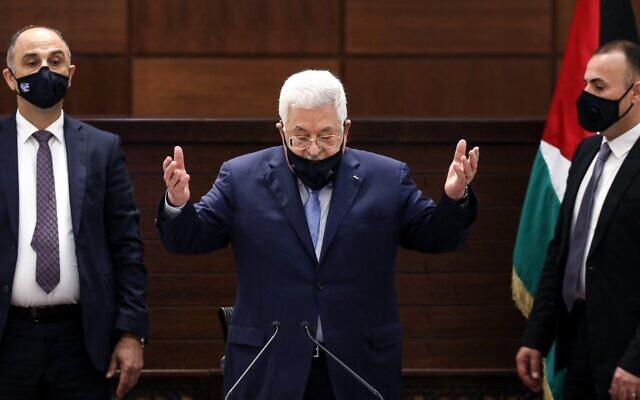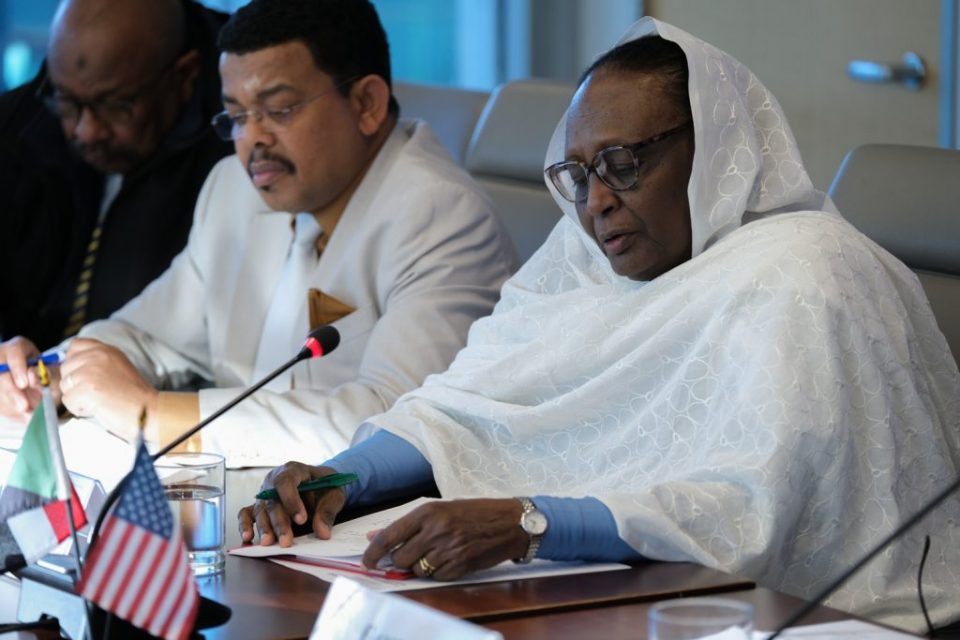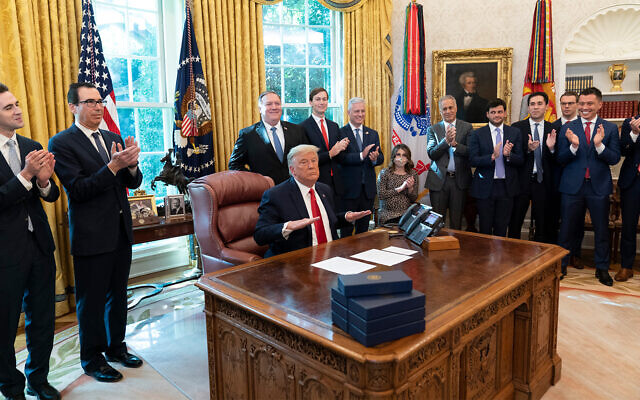Acting Sudanese FM says normalization agreement with Israel needs approval from legislative body, which does not yet exist, as country’s government undergoes transition
Following the announcement of Sudan’s normalization agreement with Israel on Friday, Sudan’s acting foreign minister said the agreement still depends on approval from the Sudanese legislative council, which has not yet been formed as the government goes through transition.
“Agreement on normalization with Israel will be decided after completion of the constitutional institutions through the formation of the legislative council,” Omar Gamareldin said, according to the Reuters news agency.
Advertisement

“This is an agreement to normalize. It is not yet normalization. We must wait for Sudan’s democratic institutions to be functional, including the legislative council, so we can complete the ratification of this step so it can become, in reality, normalization,” Gamareldin added, CNN reported.
Before the deal was announced, government sources said Sudanese Prime Minister Abdalla Hamdok had agreed, in principle, to normalize ties, but was conditioning the move on ratification by the still non-existent transitional parliament.
Sudan is on a fragile path to democracy after a popular uprising last year led the military to overthrow longtime autocrat Omar al-Bashir. A military-civilian government rules the country, with elections possible in late 2022.
It remains unclear when a transitional parliament will be formed amid negotiations between the civilian and military parts of the transitional government.
Whether or not to normalize ties with Israel has been a matter of vehement debate within Sudan’s transitional government, with its military wing, headed by Abdel Fattah Abdelrahman al-Burhan, said in favor, but Hamdok opposed.
Trump announced the Israel-Sudan deal on Friday at the White House in a call with Prime Minister Benjamin Netanyahu and Sudan’s leaders.
A joint statement from the US, Israel and Sudan released by the White House said Netanyahu, al-Burhan and Hamdok “agreed to the normalization of relations between Sudan and Israel and to end the state of belligerence between their nations.”
In what appeared to be the first public contact between the two countries after the joint phone call, Israel’s ambassador to the United Nations, Gilad Erdan, spoke to his Sudanese counterpart, Omer Mohamed Ahmed Siddig.
Erdan and Siddig agreed to meet in the coming days to discuss cooperating at the UN in the fields of technology, agriculture, trade and tourism, Erdan’s office said in a statement.
Erdan was informed of the Sudan normalization agreement during his first working meeting with the Bahraini ambassador to the UN, the statement said. Bahrain inked a normalization deal with Israel last month.
“I will act immediately to translate these agreements into cooperation here at the UN. I will show the organization’s member states that it is better to be on the side of Israel, and not on the side that condemns peace and acts against us,” Erdan said.
Israel also last month signed a normalization agreement with the United Arab Emirates.
The UAE applauded Sudan’s move to normalize relations with Israel early Saturday morning.
The UAE foreign ministry said the deal was “an important step to boost security and prosperity in the region,” according to the Emirati state news agency WAM.
Egypt, the first country to sign a peace deal with Israel in 1979, was one of the few other Arab countries to publicly applaud the Israel-Sudan deal.
“I welcome the joint efforts of the United States, Sudan and Israel to normalize relations between Sudan and Israel and I value all efforts aimed at establishing regional peace and stability,” Egyptian leader Abdel-Fattah el-Sissi tweeted.
Regional giant Saudi Arabia was notably silent.
While officially stating that it will not normalize ties until Israel signs an internationally recognized peace accord with the Palestinians, Riyadh has given tacit approval to the UAE and Bahrain deals and allowed Israeli aircraft to use its airspace.
The Palestinian leadership blasted the deal, as it did with the normalization agreements with the UAE and Bahrain.
Palestinian Authority President Mahmoud Abbas said he “condemns and rejects” the Israel-Sudan agreement.
“No one has the right to speak on behalf of the Palestinian people and the Palestinian cause,” the statement from Abbas’s office said.
The Hamas terror group, which rules the Gaza Strip, also condemned the deal as a “political sin” that harms both Palestinians and Sudanese.

The deal with Sudan will include aid and investment from Israel, particularly in technology and agriculture, along with further debt relief. It comes as Sudan and its transitional government teeter on the edge. Thousands have protested in the country’s capital Khartoum and other regions in recent days over dire economic conditions.
Before the deal was announced, Trump earlier on Friday signed a waiver to remove Khartoum from the State Department’s blacklist of state terror sponsors. Congress now has 45 days to approve the measure.
Sudan’s presence on the terror list — along with Iran, North Korea and Syria — subjects it to crippling economic sanctions and limits the impoverished country’s access to international credit.
Trump announced his intention to sign the waiver on Monday, saying he would go through with the move after Sudan followed through on its pledge to deliver $335 million to compensate American victims of past terror attacks and their families. Sudan transferred the funds the next day.
The money is meant for victims of the 1998 bombings of US embassies in Kenya and Tanzania by the al-Qaeda network while its leader, Osama bin Laden, was living in Sudan.
The United States brokered the diplomatic pacts between Israel and the UAE and Bahrain. Jordan recognized Israel in the 1990s, while Egypt was the first to sign a peace deal in 1979.
Netanyahu has made it a priority to forge ties with formerly hostile countries in Africa and the Arab world in the absence of any progress with the Palestinians during his tenure, which has lasted over a decade.


